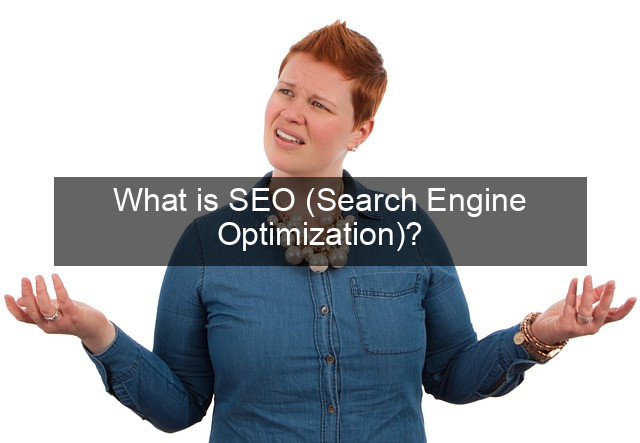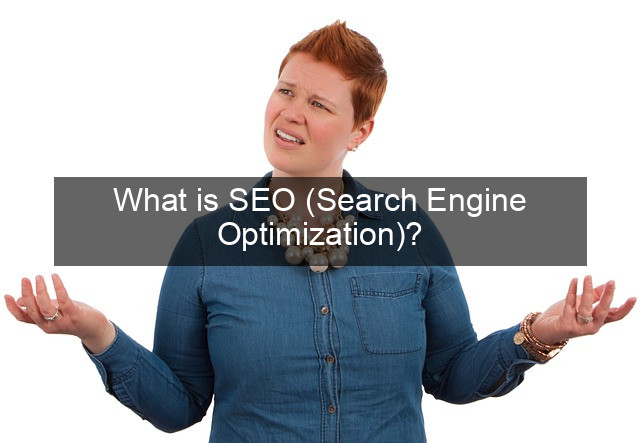What is SEO (Search Engine Optimization)?


What is SEO (Search Engine Optimization)?
Imagine a vast library filled with billions of books. You’re searching for one specific title, but how do you find it amidst the overwhelming collection? Search engines like Google act as librarians in the digital world, organizing and indexing websites to help users find the information they need. This is where SEO, or Search Engine Optimization, comes into play. SEO is the practice of enhancing your website to improve its visibility on search engine results pages (SERPs). By optimizing your site, you increase organic (non-paid) traffic, driving more potential customers or readers to your content. A higher ranking in search results translates to greater online visibility and increased opportunities for engagement.
Effective SEO involves understanding how search engines work and tailoring your website to meet their criteria. This includes optimizing both on-page elements, like content and HTML structure, and off-page factors, such as backlinks from other reputable sites. A well-executed SEO strategy can significantly impact your online presence, making it crucial for businesses and individuals seeking to thrive in the digital landscape. It’s a continuous process of learning, adapting, and refining your approach to stay ahead of the curve and maintain a strong online presence.

On-Page Optimization
Content is King
High-quality, relevant content is the cornerstone of effective SEO. Search engines prioritize content that satisfies user intent, providing valuable information and answering their queries. Creating engaging, informative, and original content is essential for attracting both search engines and users. Content should be well-structured, easy to read, and incorporate relevant keywords naturally.
Keyword research is crucial for identifying the terms people use when searching for information related to your website. By incorporating these keywords strategically within your content, you signal to search engines what your website is about, improving its chances of ranking higher for relevant searches. However, avoid keyword stuffing, which can negatively impact your rankings.
Regularly updating your website with fresh content demonstrates to search engines that your site is active and relevant. This can improve your rankings and keep users coming back for more. Content can take various forms, including blog posts, articles, videos, infographics, and more. Diversifying your content formats can cater to different audiences and improve user engagement.
Technical SEO
Technical SEO focuses on optimizing the technical aspects of your website to improve its crawlability and indexability by search engines. This involves ensuring that search engine bots can easily access and understand your website’s content. A well-structured website with clean code and proper use of HTML tags makes it easier for search engines to crawl and index your pages.
Website speed is a critical factor in both user experience and SEO. A fast-loading website provides a better user experience and can improve your search engine rankings. Optimize images, minimize HTTP requests, and leverage browser caching to improve website speed.
Mobile-friendliness is essential in today’s mobile-first world. Ensure your website is responsive and adapts to different screen sizes. Google prioritizes mobile-friendly websites, so having a responsive design is crucial for ranking well in mobile search results.
Off-Page Optimization
Building Backlinks
Backlinks, or links from other websites to yours, are a crucial ranking factor. They act as votes of confidence, signaling to search engines that your website is a valuable resource. Earning high-quality backlinks from reputable websites can significantly improve your search engine rankings.
Focus on acquiring backlinks from authoritative websites in your industry. These links carry more weight and can have a greater impact on your rankings. Avoid participating in link schemes or buying backlinks, as these practices can result in penalties from search engines.
Guest blogging, participating in industry forums, and creating shareable content are effective ways to earn backlinks naturally. Building relationships with other website owners and influencers in your niche can also lead to valuable backlink opportunities.
Social Media Marketing
While social media signals aren’t a direct ranking factor, they can indirectly influence your SEO efforts. Social media platforms provide opportunities to share your content, reach a wider audience, and build brand awareness. Increased brand visibility and engagement can lead to more backlinks and ultimately improve your search engine rankings.
Engage with your audience on social media, share valuable content, and participate in relevant conversations. Building a strong social media presence can help drive traffic to your website and improve your overall online visibility.
Promote your content on social media platforms to reach a wider audience and increase the chances of earning backlinks. Social media can be a powerful tool for amplifying your content and driving traffic to your website.
Measuring SEO Success
Analyzing Key Metrics
Tracking key metrics is essential for measuring the effectiveness of your SEO efforts. Use tools like Google Analytics and Google Search Console to monitor your website’s traffic, keyword rankings, and other important metrics. Analyzing this data can help you identify areas for improvement and refine your SEO strategy.
Monitor your keyword rankings to see how your website is performing for targeted keywords. Track your progress over time and identify any fluctuations in rankings. Understanding your keyword performance can help you adjust your SEO strategy accordingly.
Analyze your website traffic to understand where your visitors are coming from, which pages they’re visiting, and how long they’re staying on your site. This data can provide valuable insights into user behavior and help you optimize your website for better engagement.
| Metric | Description |
|---|---|
| Organic Traffic | Traffic from search engine results pages |
| Keyword Rankings | Position of your website in search results for specific keywords |
| Bounce Rate | Percentage of visitors who leave your website after viewing only one page |
- Keyword Research
- Content Optimization
- Link Building
FAQ
What is the difference between on-page and off-page SEO?
On-page SEO refers to optimizing elements within your website, while off-page SEO focuses on external factors like backlinks.
How long does it take to see results from SEO?
SEO is a long-term strategy, and it can take several months to see significant results.
Is SEO expensive?
The cost of SEO can vary depending on your needs and the complexity of your website.
What are some common SEO mistakes to avoid?
Common mistakes include keyword stuffing, buying backlinks, and neglecting mobile optimization.




